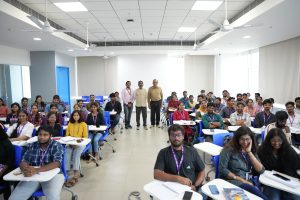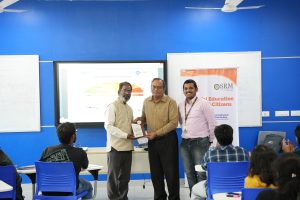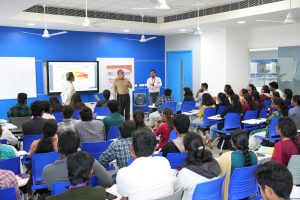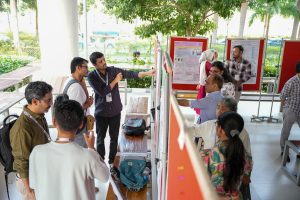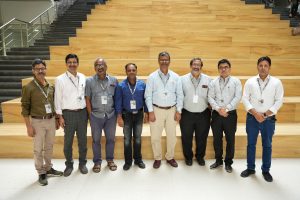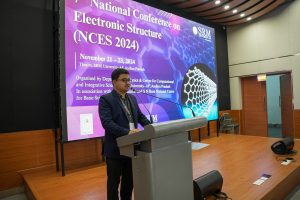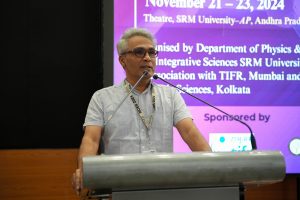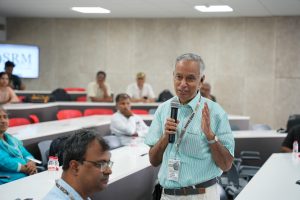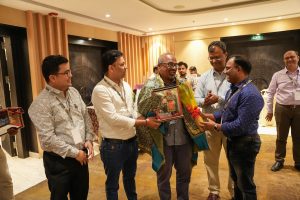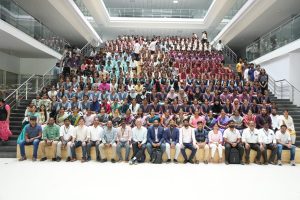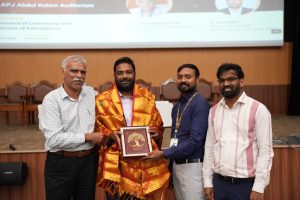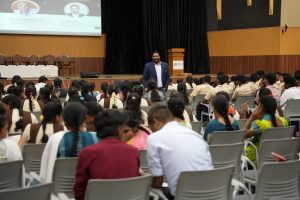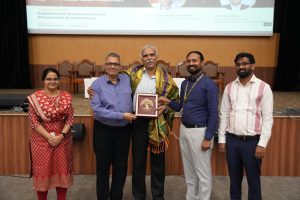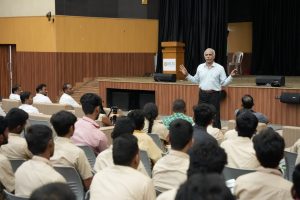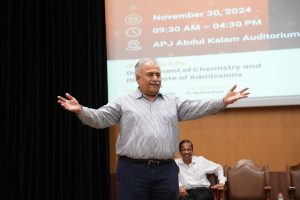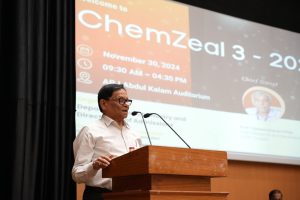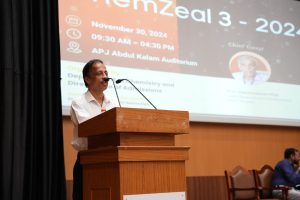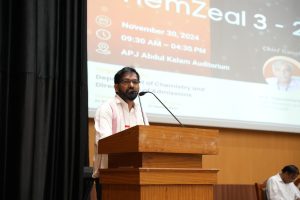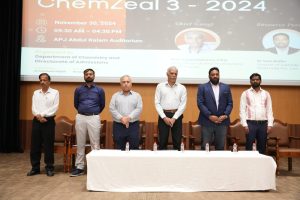All Management Events
- Dr Ankur Srivastava December 6, 2024
- BBA Course Details: Unlock Your Path to Business Management Success December 5, 2024
- Dr V Ramanjaneyulu Yannam December 5, 2024
- Dr Yenuganti Vengala Rao December 4, 2024
- Promoting Financial Literacy with NISM December 4, 2024
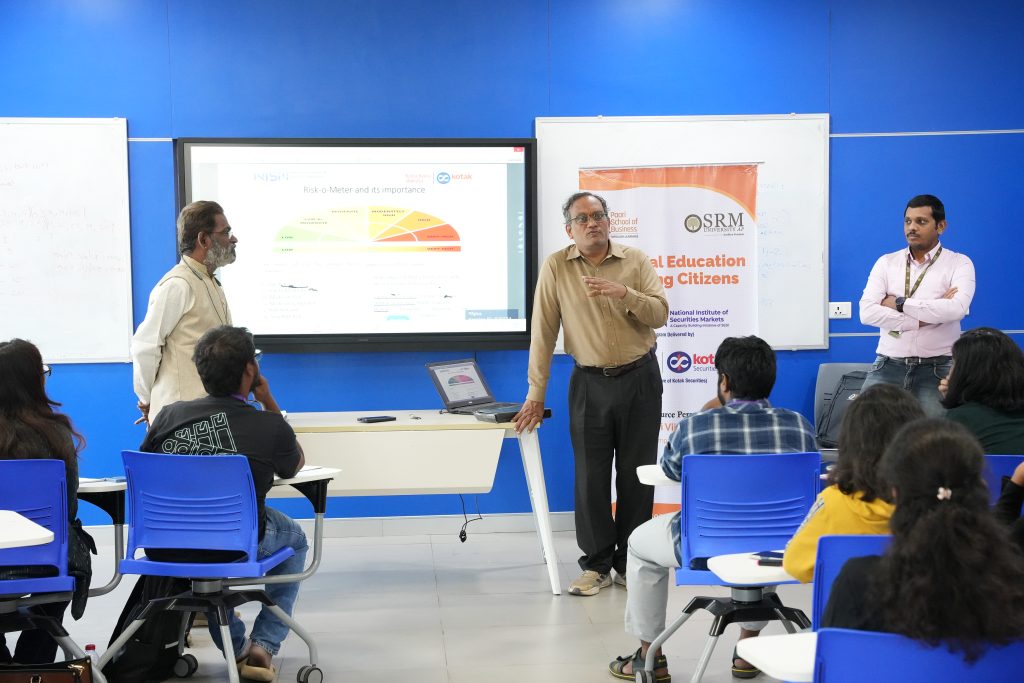
In a major initiative to promote financial literacy, the Paari School of Business organised a full-fledged Financial Education Programme under the Kona Kona Shiksha CSR Project, conducted by the National Institute of Securities Markets (NISM), on November 23 – 24 and 27 – 28, 2024. Mr Chilkuri Vijay Kumar, an NISM-empanelled resource person, conducted the programme, which saw enthusiastic participation from more than 140 MBA students.
The 10-hour programme covered, among the most important themes, career opportunities within the securities market, some investment fundamentals, primary and secondary markets, mutual funds, and various investor protection mechanisms. Besides lectures, dynamic discussions were conducted with insight into current happenings to introduce participants to the world of financial planning and investment strategies.
Mr Vijay Kumar’s interactive sessions helped students gain deeper insights into the securities market and clarified their understanding of the risks and opportunities of investment. Distributing e-certificates and comprehensive reading materials added value to the learning experience.
The session has set the stage for creating financially informed and responsible citizens. This has further reinforced Paari School of Business’s commitment to providing industry-relevant education and helping its students achieve professional excellence.
Continue reading → - Celebrating Global Unity: International Students’ Day at SRM AP December 4, 2024
A grand celebration was organised by the Directorate of International Relations & Higher Studies on November 24, 2024, commemorating International Students’ Day at SRM University-AP. Exciting competitions and activities set the tone for the festivities including events such as the Campus Marathon, Skipping Rope, Pushup Challenge, Relay Race, Sit-ups Challenge, Bicep Curls, and Tug of War, showcasing students’ athleticism and teamwork. Fun-filled games like Squid Game, Spin Race, Charades, and the Lemon-on-Spoon Race brought laughter and energy, while the Eating Competition and Football matches added to the vibrant pre-celebration atmosphere.
The winners of the competitions were recognised during the final celebration day, where they were awarded certificates and medals, adding a sense of pride and accomplishment to the festivities. The grand event was a spectacular showcase of global cultures and talents, featuring captivating performances, cultural showcases, and engaging activities. An array of cultural performances featured traditional African dances, Sri Lankan songs, Nepali songs, artistic performances, and a stunning ramp walk showcasing traditional outfits. The short film screening and musical acts added a creative flair, while the open mic provided a platform for participants to engage and shine.
Distinguished leaders, Director of CLM – Mr Anup Singh Suryavanshi, Director of Communications – Mr Pankaj Belwariar, and Assistant Director IR&HS – Dr Sudeshna Saha, graced the occasion with their inspiring speeches. The event highlighted the diversity and enthusiasm displayed by the students, creating an atmosphere of celebration and camaraderie. With seamless organisation and enthusiastic participation, this day reflected the spirit of global unity and cultural exchange, leaving a lasting impression on everyone present.
Continue reading → - “Physician, Heal Thyself”: The Transformative Power of Self-Awareness in Education December 4, 2024
- Intranet-Home-s December 3, 2024
By Testing
Continue reading → - SRM AP Hosted the 7th National Conference on Electronic Structure December 3, 2024
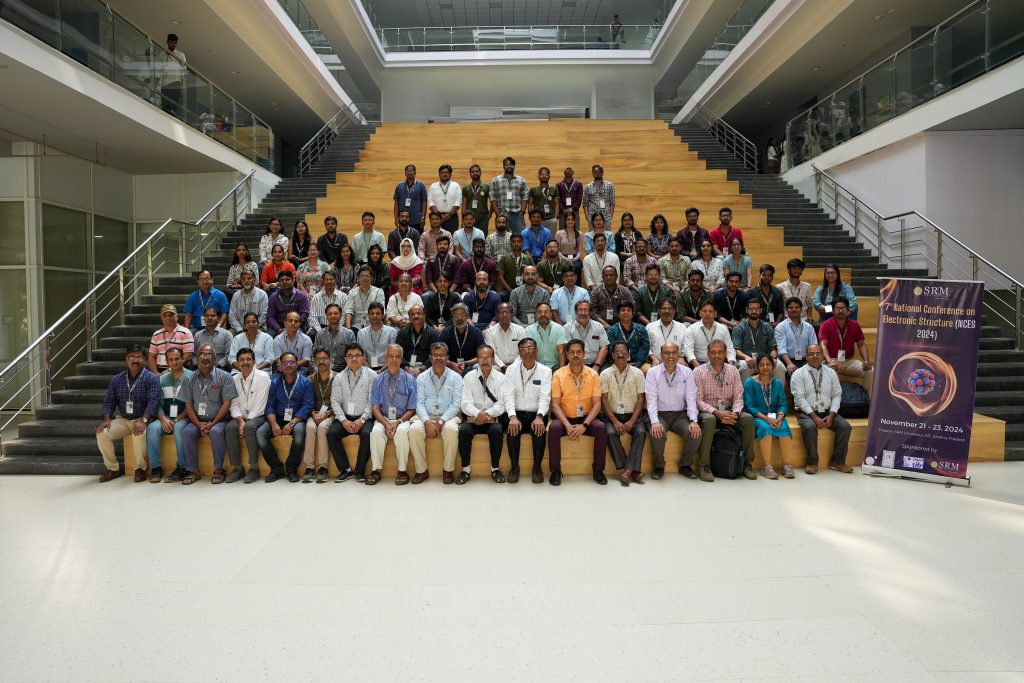
The 7th National Conference on Electronic Structure successfully concluded at SRM University-AP on November 21 – 23, 2024, under the aegis of the Department of Physics and the Centre for Computational and Integrative Sciences. The conference provided a dynamic platform for discussions and interactions on the recent advances in electron spectroscopy, microscopy, and related theoretical approaches to understanding the electronic structure of materials.
NCES was also aimed at capacity building in the field of electronic structure. Scientists, researchers, and scholars from universities and research institutes assembled to delve deep into research on electronic structure-related projects and works. Scientific discussions and invited lectures showcased insightful sessions by domain experts from India.
Out of forty poster participants, four poster winners were awarded a certificate of appreciation and Rs.3000/—each in recognition of their effort and dedication, contributing to their success.
Prof. Ranjit Thapa (Convenor), Prof. Kalobaran Maiti (National Convenor), and Prof. B R Sekhar (National Convenor) spoke about the significance of the event, which helped scholars know the importance of the NCES event in terms of fruitful scientific interactions and collaborations with each other.
The participants were also on a short tour around Undavalli caves and Kanak Durga Temple. The tour plan facilitated an informal platform for participants to communicate freely and network with others for long-term collaborations.
The 7th National Conference on Electronic Structure was an inspiring experience for all participants, encouraging research scholars to work in the field of electronic structure. The conference also facilitated a conducive environment for problem-solving and innovation.
Continue reading → - Inspiring Future Chemists at ChemZeal 3 December 3, 2024
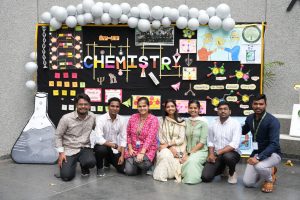 On November 30, 2024, the Department of Chemistry, in collaboration with the Directorate of Admissions, hosted ChemZeal 3, a flagship event that showcased the ever-expanding scope of chemistry in today’s world. The event was graced by prominent personalities, including the Chief Guest, Prof. Vijayamohanan Pillai, Dean of Research & Development at IISER Tirupati, and Dr Veerababu, Director of Cathode, GODI India Pvt. Ltd., Hyderabad, who served as the resource person.
On November 30, 2024, the Department of Chemistry, in collaboration with the Directorate of Admissions, hosted ChemZeal 3, a flagship event that showcased the ever-expanding scope of chemistry in today’s world. The event was graced by prominent personalities, including the Chief Guest, Prof. Vijayamohanan Pillai, Dean of Research & Development at IISER Tirupati, and Dr Veerababu, Director of Cathode, GODI India Pvt. Ltd., Hyderabad, who served as the resource person.The event began with a welcome address by the convener, Dr Satheesh Ellipilli, who provided an insightful overview of the programme and reflected on the immense success of the previous editions, ChemZeal 1 and 2. He expressed excitement about the growth of the event and its contribution to advancing the knowledge and application of chemistry in various fields.
Following the welcome, the Head of the Department of Chemistry delivered an inspiring speech, offering a comprehensive overview of the department. Dr Pardha Saradhi Maram, Associate Professor and Head highlighted the department’s commitment to academic excellence, research innovation, and fostering an environment where students can explore the transformative power of chemistry.
One of the major highlights of the event was the launch of the “Post a Q” portal by Vice Chancellor, Prof. Manoj K Arora. The portal aims to provide a platform for students and researchers to ask questions and seek solutions in the realm of chemistry. During the launch, Prof. Arora remarked, “Chemistry is such a wonderful science that, no matter what you think of, you will find chemistry in it.” This statement underscored the far-reaching impact of chemistry on everyday life and innovation.
The keynote address by the Chief Guest, Prof. Vijayamohanan Pillai, focused on generating and storing clean energy. He discussed the pivotal role that chemistry plays in developing sustainable solutions for energy storage and generation, from battery technologies to renewable energy sources. Prof. Pillai’s talk resonated with the audience, particularly in the context of the growing need for clean energy in the face of global environmental challenges.
The resource person, Dr Veerababu, shared valuable insights into cathode materials and their applications in the energy sector. His expertise in battery technology and his role at GODI India added depth to the discussions, providing students and faculty with a practical perspective on the industry’s current advancements.
ChemZeal 3 successfully fostered a spirit of collaboration and intellectual curiosity, highlighting the dynamic nature of chemistry and its potential to address some of the world’s most pressing issues. The event concluded with a vote of thanks, acknowledging the contributions of all the speakers, participants, and organisers who made the day a resounding success.
Continue reading →


